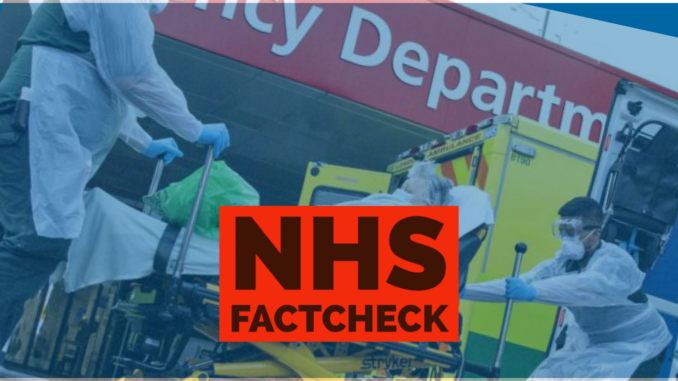
Factcheck 2
“Is the NHS is a funding ‘black hole’ – does it never have enough”
Factcheck 1 Does the NHS already have enough money?
Factcheck 2 Is the NHS a funding ‘black hole’?
Factcheck 3 Is there ‘too much waste’ in the NHS?
Factcheck 4 There isn’t enough money to fully fund the NHS
Latest in the Factcheck series from Sally Ruane
Sally Ruane is a member of Keep Our NHS Public Executive. She is a member of the Institute for Applied Health Research at De Montfort University, Leicester. She has published in books, academic journals and magazines in the UK and Spain.
There is a worry that, because the NHS is so large and complex, it represents a ‘black hole’ into which money can be poured with no obvious outcome to show for it. However, this perception is largely the result of two key government policies:
- The wasteful use of market structures and competitive processes which make no contribution to the effective allocation of resources for preventing and treating ill health. The costs of buying and selling services have never been properly assessed but amount to billions of pounds every year[1].
- A deliberate funding decision in the past decade or so to impose a decade of ‘austerity’ on the NHS between 2009 and 2019 – meaning unprecedentedly low annual funding increases such that funding barely kept up with inflation and could not possibly keep up with patient need – resulted in a significantly weakened NHS when the pandemic hit. With its capacity held down by government policy, the NHS fell further and further behind in being able to treat patients on the waiting list so that even before Covid-19, the waiting list had already almost doubled since 2010. The result is that the government has been trying to play catch up.
Countries which had better funded health systems going into the pandemic have had to find significantly less additional funding for covid than countries like the UK which had more poorly funded health systems and constrained capacity[2].
Poor funding resulted in too few beds in hospitals, too little investment in GP services and staff training and in pressure on staff so that many left. These consequences of low funding have all left the health service in a very weak state.
Additional funding can make a big difference.
When Labour significantly increased the annual NHS funding rises in the 2000s, there was a marked improvement in the capacity of the NHS to drive down waiting times and give patients prompter treatment. Unfortunately, money was wasted on market systems and numerous restructurings which wearied staff; without these, the NHS could have achieved even more with that level of funding. However, the improvements that were experienced demonstrate that good levels of funding can result in a better service and that the NHS is not a black hole which swallows money with nothing to show for it. When adequately funded in the 2000s, it was regarded as the most cost-efficient and fair (accessible) major health service in the world[3].
International comparisons show we do not overspend on healthcare.
UK funding of healthcare is below that of France and Germany[4]. Experts have also found that the UK’s comparatively lower levels of funding go back historically: between 1980 and 2013, the UK spent each year on average around a fifth less on health care than other European countries[5].
This is a long period over which to fall behind. International comparisons have also shown we have fewer doctors and nurses per head of population and fewer MRI and CT scanners for population size than other high-income countries, reflecting inadequate investment in both staff and equipment[6].
Sally Ruane, Keep Our NHS Public Executive
[1] For example https://www.opendemocracy.net/en/ournhs/billions-of-wasted-nhs-cash-noone-wants-to-mention/
[2] https://www.nuffieldtrust.org.uk/news-item/health-spending-during-covid-19-how-does-the-uk-compare
[3]https://www.commonwealthfund.org/sites/default/files/documents/___media_files_publications_fund_report_2014_jun_1755_davis_mirror_mirror_2014.pdf
[4] https://data.oecd.org/healthres/health-spending.htm
[5] https://www.ncbi.nlm.nih.gov/pmc/articles/PMC5010654/
[6] https://www.health.org.uk/sites/default/files/2019-10/20191024%20-%20Long%20read%20-%20International%20comparisons%20of%20capital%20in%20health%20care%20-%20Web%20version_0.pdf
Read more in our Factcheck series
Factcheck 1 Does the NHS already have enough money?

Leave a Reply